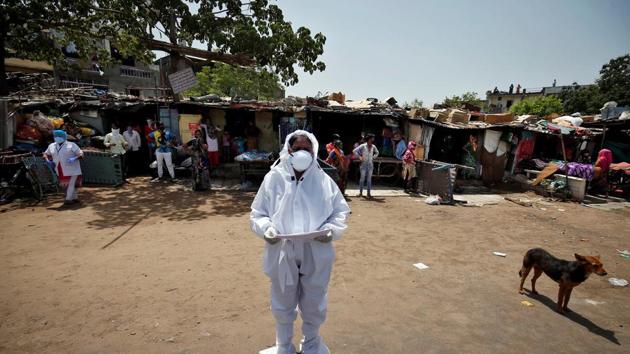Blind people fear days after lockdown, say social distancing is a curse
For a section of citizens, social distancing and physical distancing has come as a curse. These people depend a lot on others when they are out of the streets.
Rahul Gambhir, a 31-year-old banker from Mumbai, is worried about the day when the Covid-19 lockdown will be lifted and he will have to join office again.

His office is at Nariman Point, which is at least 20km away from his flat at Chembur.
There are several questions worrying Gambhir, who is totally blind since birth.
Like before, will a passerby be ready to hold his hand and assist him to board the train from Chembur railway station? Will he able to hold the hand of that stranger without hesitation? How will he be able to cross the busy Chhatrapati Shivaji Maharaj Terminus (CST) station without any assistance?
“These questions are passing through my mind now. I am sure people like me are also thinking in the same lines. Because such a problem is bound to arise, the moment we step outside of the house again after the lockdown to resume work,” said Gambhir.
“Manoeuvring through the CST station during peak office hour will become next to impossible without assistance,” he said.
His wife Geetanjali , who works in a government school in Delhi and lives in the Palam area of the national capital with their three-year-old daughter, is also totally blind since birth.
She will also face the same problem and so will millions of other blind people in India.
For people like Rahul and Anjali, they primarily depend on touch to know what’s in front of them. For this section of citizens, social distancing and physical distancing has come as a curse. These people depend a lot on others when they are out of the streets.
“As long as we are within the four walls of our houses or inside the office, we don’t need any assistance. It is because the ambience is known to us. But when we are out of the roads and travelling we need some kind of assistance – to board buses and trains, to cross the road,” 55-year-old Indranath Banerjee, said.
The history teacher at Ramakrishna Mission Blind Boys Academy at Narendrapur in the southern fringes of Kolkata has to first take the Metro and then an auto-rickshaw to reach the academy, at least 30km away from his home.
According to figures provided by the Union health and family welfare ministry in the Lok Sabha on November 29, 2019, at least 0.36% of the Indian population is blind. This puts the number of blind persons in India to not less than 3.7 million.
“I have heard that nearly 80% are patients are asymptomatic. While on one hand, I may not get any assistance, on the other hand, what could be worse is that without any assistance I may bump into a person who might be a carrier,” said Vaishali, a blind student studying BA at the Government First Grade College in Bengaluru.
“We need to touch each and everything to get an idea of our ambience. That’s even more worrisome,” she said.
Students like Vaishali have yet another reason to worry about—exams.
Usually, they take the help of scribes who sit closely. The scribes read out the question, the blind person dictates the answer and the scribe pens it down on the answer sheet.
“Once the schools and colleges reopen, we will need such help as exams will be held. I wonder who will volunteer because scribes need to sit very close to the blind person in the exam hall,” she added.
Keeping in mind all these difficulties, which may arise once the lockdown is lifted, NGOs working for blind persons in India are now coming up with guidelines in the form of do’s and don’ts for their members to avoid contracting the disease.
“Apart from the basics such as wearing masks and gloves, we would tell them to carry a small hand sanitiser every time they go out. They should not hold the strangers’ arms, hands or palm, instead they should just touch his shoulder while crossing the road,” Prashant Ranjan Verma, the general secretary of National Association for the Blind in Delhi, said.
Verma said they are also planning to approach examination boards which conduct examinations such as ICSE and CBSE to find out if there could be an alternative way where blind students don’t need scribes.
“Maybe they can get recorded questions (audio) and can record their answers and send them to examiners,” he added.




